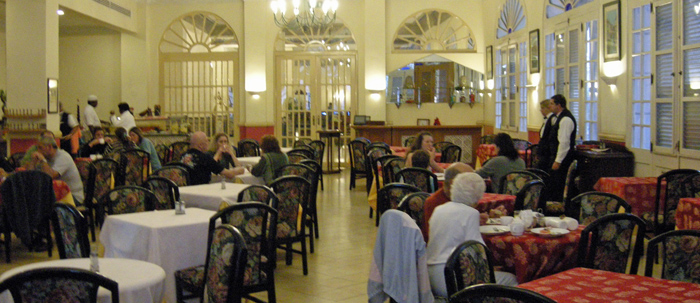
With Buzz and Toni gone, we’re down to five. The morning
begins with our usual 9 AM breakfast (very civilized time, I reckon).

Breakfast room at the Sevilla
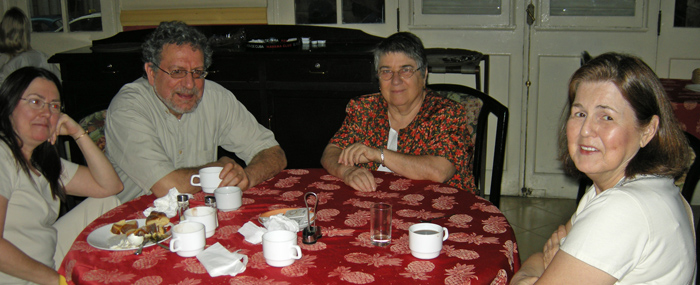
Taylor, Richard, Heide, Chippie at
breakfast
Heide wakes up feeling better today, but decides
to put off
walking about the city till after lunch.
Chippie and I, however, head to the Capitolio.
El Capitolio. El
Capitolio, originally Cuba’s
parliament building, now a museum to its past, was built in the 1920s
and is
modeled on the US Capitol. Chippie
has made it a policy to try to visit all the state capitols in the US
(ironically most of the ones she’s missing are on the East Coast), and
wants to
continue this activity by visiting them in foreign countries. (The place where the Cuban assembly now
meets is in the “Palacio de Convenciones,” a convention hall. As the assembly only meets twice a
year, it’s hardly the same thing.)
It was not only cold today, but rainy. A
true
“yucky”
day. I
did
have a rain jacket in my bag and
wore it, and … what’s a little cold rainy (55 F) day when at home it’s
in the
20s and
could easily be snowing.
It’s a very nice visit and a very nice building. If Chippie was hoping to remember the
visit through photos, however, she had to think twice as her camera
battery
died shortly after arrival… She did, however, get a picture from
inside the
cupola.
In the Capitolio shop, one of the items for sale
was a
framed poem written by a poet named “José Aguilera Besteiro.”
There aren’t that
many Besteiros in Cuba, but after making inquiries of the family, no
one knew
of him. Nor could google find him.
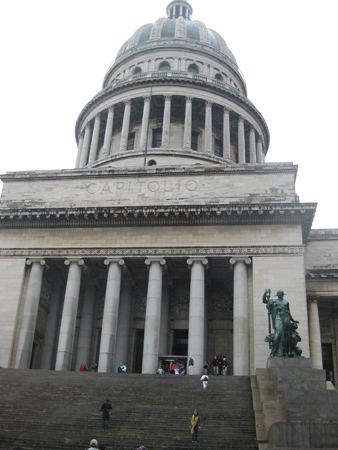
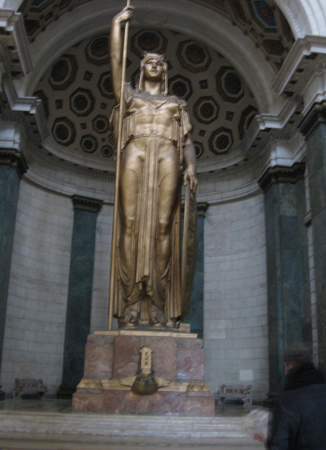
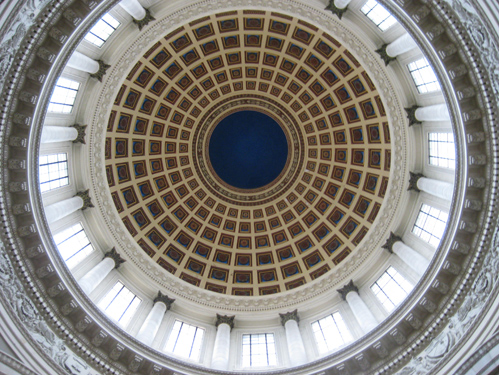
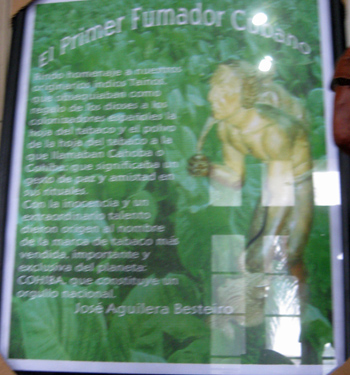
Mid-day we all did our thing, and mid-PM we had a
visit
Mercy and family visit us. We were
scheduled to meet Micky AKA Miguelito, Mercedita’s brother, but he
doesn’t make
it. Miguelito, whom we saw with
his first wife the first time we came, is now remarried and has a small
child
(his first two children are in their mid 30s). Mercy
explains
that
he
lives
far
away
in
sub-standard
housing,
and
that
he’d
have
to
take
two
buses
and
wait in the rain, so
that it
would very difficult for him to make it.
Buzz is sorry not to see Micky; when he was in
Cuba in 1991
to watch his son Manuel represent the US in the Panamerican Games,
Manuel met
several family members including Micky.
Besides the people whom we met on Thursday, Mercy
and
Enrique’s son Geovanni joins us with his daughter Thalia.
Sheila and Thalia are two weeks apart
in age (born September 17 and October 2, 2004, respectively) and are
good
friends. Sheila is the more
outgoing of the two, and Thalia appears to have a remarkable talent for
art.
Sheila (pronounced “CHAY-la”) was very shy when we
first met
her, but she is now very outgoing, even correcting Taylor’s Spanish.
The doll
was not “¡que bella!” as Taylor said, but rather “¡que
linda!”
Taylor took videos with her iPhone of Thalia
&
Sheila
dancing on the stage in the hotel lobby area, and them
replayed them;
the girls
really seemed to enjoy watching themselves. Then
she
showed
them
how
to
use
the
iPhone
to
take
pictures
of
each
other,
another
enjoyed
activity.
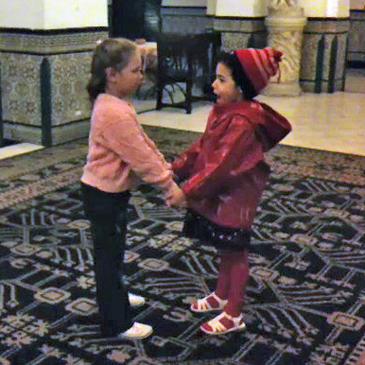
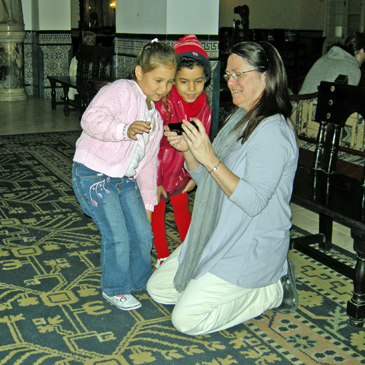
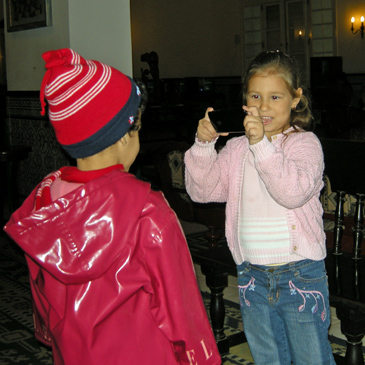
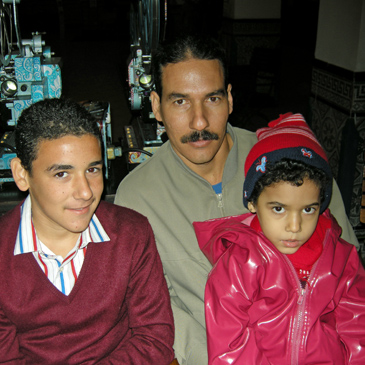
Richard and I had a very long conversation with
Enrique (he
was responding to our many questions about the structure of the
government, how
it’s chosen, how they make decisions, etc) and it was very interesting. Among the many points he brought out
were that they have come to the conclusion that equality for all is
often not
the correct answer – for example, doctors, who have invested so much
time in
their education and are highly skilled, really deserve to earn more
than people
without their training or skill sets.
And also that people who work hard should be rewarded more than
those
that don’t: Enrique himself has earned the right to own a car and a
refrigerator, things he never had growing up.
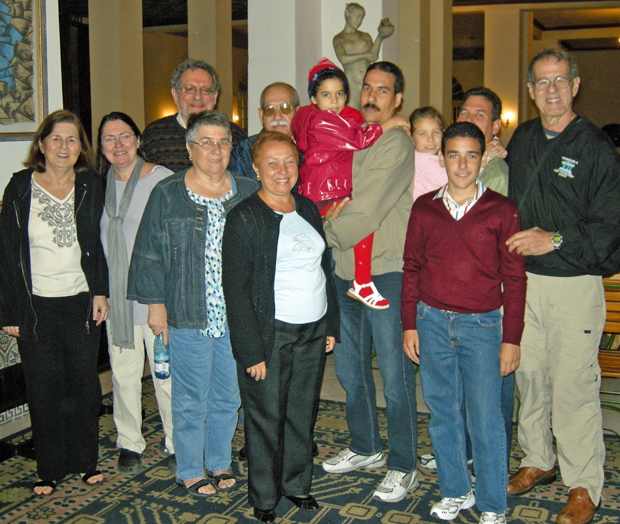
El gato tuerto (the one-eyed cat). The
old part of town, where we were staying, is not only where so many
historical
places are located, but also the only part of town where everything is
close enough to walk (at least, walk in what we would consider
reasonable times - say less than half an hour). The
late
nightspots,
however,
are
located
in
Vedado, a couple of miles to the
West. José
Antonio and Magda took the five of us to “El Gato Tuerto” (the One-Eyed
Cat)
(¿peepin’ in a seafood store?), one of the late-night spots in
Havana (it
didn’t open till 10 PM and kept rolling till 3 AM).
I had been there with José and a couple of the rugby guys
back in 2001 when a quartet sang a mixture of Cuban and international
music,
including the absolutely best version of Barbara Ann that I have ever
heard.
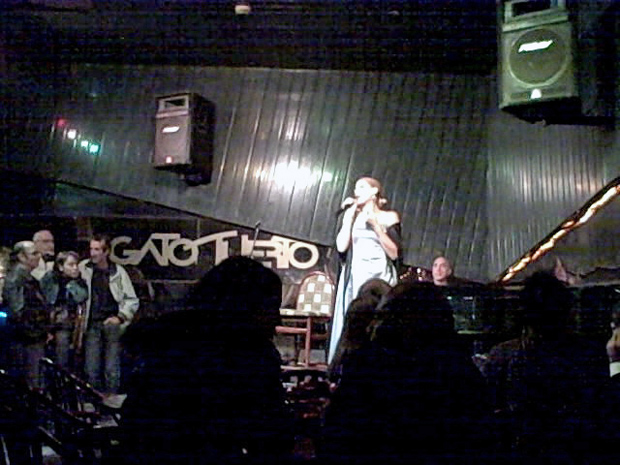
Here are a couple of video snippets
from the evening (all are partial songs only):
By the time the second performer came on, well
after
midnight, we were quite tired and after a couple of songs we decided to
leave. Just as we paid the bill,
however, the performance got a bit more animated, as the singer went
into a
performance of the Cuban classic Sarandonga, and a few of the Cubans at
the
table next to us started dancing.
Oh well, I thought, it is late for us oldsters … and we left for
home. One of our cabs needed a
push-start, but it started. After
all, this is Cuba. Cuba, where everyone is fond of saying, “Everything
is
difficult, but nothing is impossible.”
I wake up sick as a dog. My week in Cuba has effectively ended. Heide, however, is now well. We have three visits today. I make it down for the first two, but basically spend the entire day in bed.
Micky has decided to bring his family to visit, but as they head to the bus stop it starts raining again. He comes alone, however, and shows us a picture of his son Miguel Alejandro. He also says “mi esposa es …” (my wife is … ) and then rubs two fingers on his wrist. This, we find out, is the Cuban “secret signal” for “black.” (Well, Cuban secret signals – including making a beard with the fingers – are not really so secret.)
Odd.
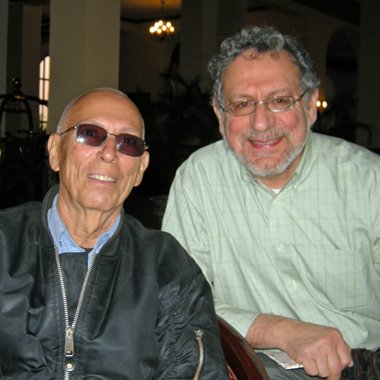
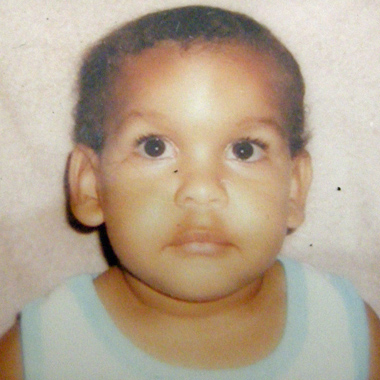
Left: Micky and Rich, the 1955 ball
players
Right: The youngest of the Miguel
Besteiros
I go back to bed but reappear briefly when Diana
and Simón
and their son Arturito come to visit at the hotel.
I agree to perform a task for them in the US, and go back to
bed. Chippie ends up spending a couple of hours discussing politics
with them.
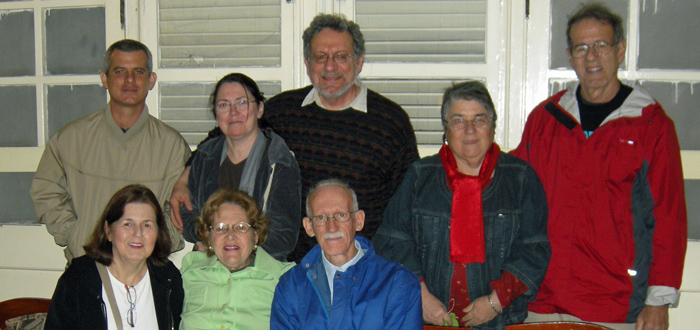
As they leave, José and Magda drop in to say goodbye. (I am still in bed for all this.)
I am ignorant of what
others do today. Richard,
however,
has
filled
in
his
and
Taylor’s
activities
for
Sunday’s activities. They follow, in red and a
different type face.
Spent some
time with Miguelito (Micky) in the morning. Pleased to find out that he
was one
of the ones I played baseball with back in '55.
Taylor and I
went to the "Fábrica de Tabaco Partagás" but we couldn't
see anything
but the store. The workers were on vacation until the 18th (I think).
Saw
police dog being trained. Walking back toward Old Havana we ran into
Micky who
was on his way home, walking in front of the Capitolio. Chatted briefly.
Went down
Calle Obispo. Bought some crafts at the feria (containers carved out of
wood).
The artist (in his 70's) was interesting; of the Bahá'í
faith; his works had
both Roman and Arabic characters. He explained briefly his religion,
which
originated in Iran. He explained briefly his own history: his father
was was a
rabid anticlerical Spanish atheist who left Spain for Cuba in the late
20s with five kids. Some are still in Cuba, some left, some are
atheists,
some are religious, none are Catholics. In speech and demeanor, he
seemed like
a mystic.
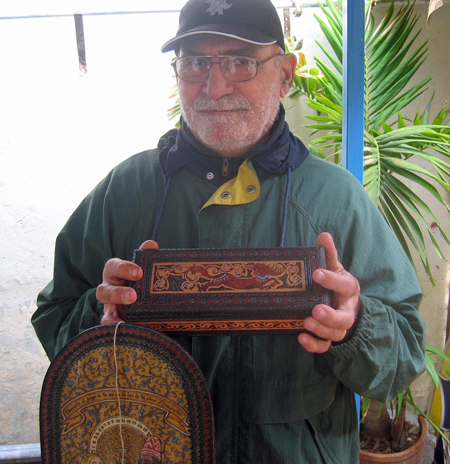
We made
acquaintances at an art gallery where we bought a painting: a depiction
of the
orisha Changó (Christian counterpart, Santa Bárbara). The
artist, Rogelio
Godines, has dual residency, in Russia and Cuba. Currently, he is
living in
Moscow and, if my memory is correct, has been the director of a Latin
American
art institute in Leningrad. We had a nice chat about the art scene in
Cuba with
an artist named Almer (Álvaro Almaguer) who also has dual
residency: in Havana
and in Lisbon. Artists have much more freedom than other Cubans. "Pero
la
libertad cuesta mucho," he said, referring, I assume, to the cost of
maintaining his Lisbon flat.
When we got
back to the hotel, we spent some time with Diana, Simón and
Arturo. Chippie
spent a LOT of time with them.
Taylor and I
went in search of places I had wanted to see but hadn't had the chance.
It was
Sunday afternoon and most stores and museums were closed. The Plaza
Vieja
reminded me of the Plaza Mayor in Spain....
At night,
Taylor and I went to have dinner at "El Templete." (Emil was sick,
Heide didn't want to go, and Chippie was still talking with Diana,
Simón and
Arturo). The meal, "Parrillada de mariscos," was delicious. We got to
chat quite a bit with the guy in charge of the restaurant and he
treated us to
an exquisite copa de añejo. He served it in a snifter and it was
better than
any cognac I can remember tasting. We talked, not just about rum but
about
living in the countryside. His ancestors came from Spain more than 300
years
ago and his family had always lived in "el campo."
Fortunately, we are not on the same flight schedule as Buzz
and Toni; fortunately we don’t have to leave the hotel until 11 AM. We
sleep in, I
feel
better, though my back is killing me (probably from being in bed for
the better
part of 36 hours) and we have a pleasant ride to the airport.
I do race to Monserrate to try to get Raul to find
just one
more certificate for me. During our conversation with Alicia and Roxana
on
Thursday night they discuss their quest for Spanish citizenship. They need to prove their parent or
grandparent was a Spanish citizen.
This is indeed the case, because Alicia’s mother Manolita
Graciani was
born in Madrid. I happen to know,
however, that there is a problem because Manolita’s mother Manuela and
Alicia’s
father Joaquín Graciani were never married.
On Manolita’s birth as recorded in the Madrid Archives,
which is all I’ve been able to see, she is listed as Manuela
Sánchez López, the
same as her mother, and there is no father listed. The last time I was
able to
check in Spain, her actual birth certificate was marked private. 100 years from her birth, which would
be 2006, this certificate should have been available for the public.
Diana’s daughter Dianita was supposed to have
gotten this
certificate and sent it to Alicia, but so far it hasn’t arrived. And we don’t know what it says.
I’ve have tried to dance around this
subject with Alicia, but to no avail.
We’ll see what it says. In
the meantime, given the depth of detail of Spanish baptismal
certificates, I
reckon that Alicia’s will give the name of her parents, birth place of
her
parents, ditto for her grandparents.
Her mother, according to what we know, arrived in Cuba as
“Graciani
Sánchez” and not “Sánchez López, ” and her
grandfather Joaquín would surely be
mentioned as well as Manuela Sánchez as grandmother. My guess is
that tying
this record in with the Spanish records will help them make their case.
Nevertheless, Raul is not there at the 10 AM time
he’s told
us he starts. I wait till nearly 10:30 then head back to the hotel to
catch the
11 AM cab we’ve organized for the airport.
Richard and Taylor have had a more
exciting
morning. Again, I quote Richard in red.
In the
morning, Taylor and I went to the 9th floor of the hotel which had
spectacular
views of Havana. We went to the 9th floor bar (I forget its name) where
the
"Mary Pickford" cocktail was invented and we split one. I think I
filmed the bartender as he explained the drink and its history.
We get to the airport, the cab driver asks,
“International
terminal?” and we say yes.
Terminal 2. We get to
the international terminal,
leave the cab, and enter. It’s a
really nice terminal, completed I believe in 1999 and I
remember it
well. We head to the information
desk and ask for the Miami flight, and the woman behind the desk says
“direct
to Miami?” and we say “yes.” “You’re
in the wrong terminal, you need to go to terminal two, she says.” Damn! I think. No
wonder that chaos at baggage seemed
so unfamiliar to me when we arrived.
We look around, find a cab, and take the five-minute ride to
Terminal 2.
According to the cabbie, the only flights that
leave or come
in to this terminal are flights directly to or from the USA: Miami, New
York
and Los Angeles. And in fact, it’s
a piece of crap terminal… My guess is it’s the original Havana
terminal, from
many, many years ago. Our flight has not yet been called and we’re
trapped in a
tiny room that precedes entry through a preliminary check for boarding
documents prior to check-in and security screenings.
The Cuban authorities seem eager to screw Americans at every
opportunity. A small measure of
revenge.
We finally are able to push and shove our way
through and
then onto the line for check-in.
Following this we must pay a 25 CUC exit tax (which we didn’t
know about
till Toni emailed this info to us; we were now, however, prepared).
All this time, the travelers’ family members are
squished
together at the departure point.
We were too much in shock to photograph the mob when we entered,
but I
get a little video of everyone saying goodbye.
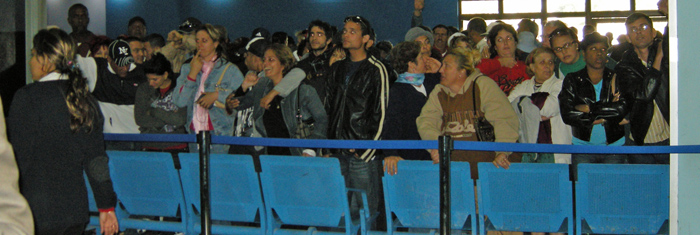
We got through security with no issues, i.e. no
loss of
passports, and made it back to Miami with no trouble.
Heide, however, racing ahead of me, got onto a line at
immigration that wasn’t moving, and not till we looked up did we
realize we were
on a “visitors” line. By the time
we moved, got through customs and got our bags, we had missed Chippie,
Richard
and Taylor.
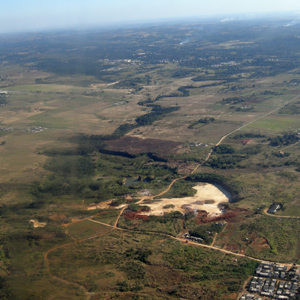
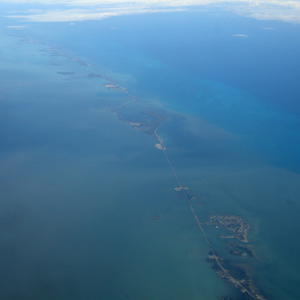
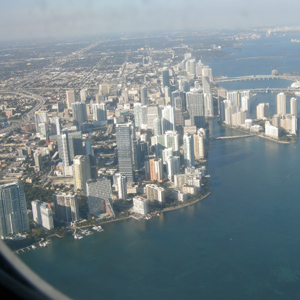
Three stages of the 40-minute flight:
over Cuba, over Florida keys, over Miami
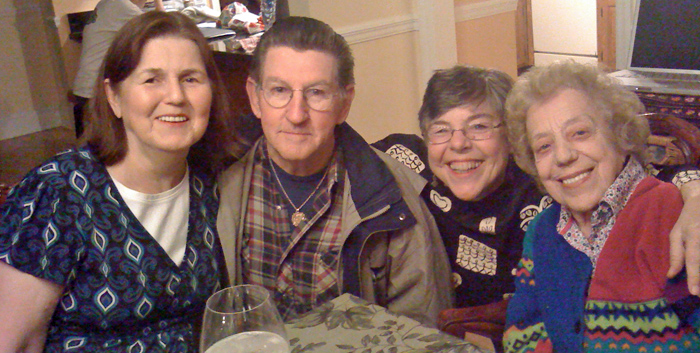
Cousin Rodolfito.
We found a nice and relatively inexpensive La Quinta near the hotel and
called
cousin Rodolfito. Rodolfito (AKA Rudy),
like
Mercy and Micky a grandson of Uncle Dominic, left Cuba in 1968 at the
age of 14
½ (had he lasted till 15 he would have been forced to enter
military service
and been ineligible to leave) (or maybe the two ages were 15 and 15 ½), and is one of those
ultra-conservative
Cuban
exiles in Florida that we hear so much about. We make a plan to see
Rodolfito
and family, including Raquelita, 83-year old sister of Miguel
Ángel, and along
with Aunt Jo, one of the last two remaining members of that generation. Richard and Taylor show up at the hotel
next door to ours. I eagerly
invite them to join us (Rodolfito was excited to be able to offer them
his
hospitality as well), but they decline.
I thought this would be the perfect point/counterpoint - two
views of Cuba - Havana, then Miami. Oh well, their loss, I reckon.
I had forgotten about Miami traffic, and it takes
Rodolfito
quite a while to make it to our hotel.
We head to his mother Raquelita’s house, where we polish off a
bottle of
wine while showing them all the pictures from our trip – it’s a good
way for
them to reacquaint themselves with their relatives (though it’s been
more than
40 years since Rodolfito’s been there, Raquelita has been there about
10 years
earlier) and see what remains of their precious Havana: as they know,
it’s a
sad remainder of what it once was. I’m a little worried about surviving
the
wine as, in the last two days I’ve had nothing but one breakfast, but –
both
here and at the restaurant – I’m a trooper.
As we had video of the two songs we heard at La
Mina, we
played them for them. I think they were both very impressed by the
sextet’s
version of Manisero.
Rodolfito has told me earlier that he really is
dying to
visit Cuba, but I know he will not go, on moral grounds, until the
current
regime sees its last day.
While we are there he speaks to his daughter Angie
and gets
info on her husband and son for my database. And
she
promises
to
send
photos. Always
updating.
Rudy’s wife Vivian joins us and the five of us
head to an excellent Spanish restaurant - Taberna de San Roman - on
25th Street near the Miami airport. We have a wonderful
meal –
I took Rudy up on his suggestion of codillo a la brasa –, some very
good wine,
and then it’s time to head back to the hotel.
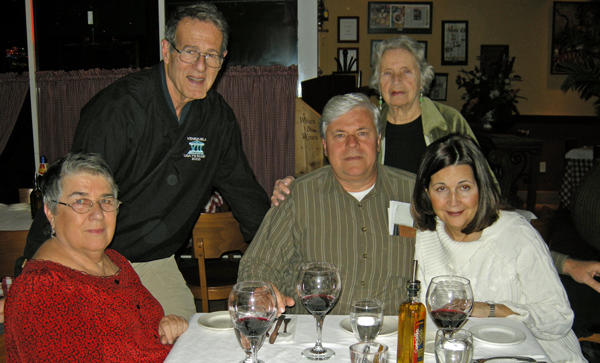
With Raquelita, Rudy and Vivian in
Miami.
Rudy is Mercy and Micky's first
cousin. (Raquelita is their father Miguel Ángel's sister.)
A completely uneventful day. Intelligently,
I
have
scheduled
a
3
PM
flight. We sleep
in, check out at noon, head to
the airport, catch our flight to Charlotte, visit the tequileria for a
meal and
a drink, catch our flight to Allentown, get a cab home, check a few
emails,
have my version of añejo (Mount Gay Barbados rum), and go to
sleep …
Richard and Taylor, it turns out, have missed
their first
flight and barely caught a 10:30 flight back.
But tomorrow is another day.
Richard concludes his
write-up:
11th
Flight
back to Miami. Missed our flight to Boston. Totally exhausted,
physically and
emotionally. Could not accept Rodolfito's invitation to dinner.
12th
Despite
taking the 6:00 am shuttle for our 7:30 flight, we got there late and
missed it
again. (If Emil had been with us, we would have been up at 4:30 and
taken a
cab.) We were the last two standby passengers to get on the 10:30
flight.
Emilito notes: Richard should have worded
it thusly, "If Emil had been with us, we would have made the flight."
Cuba
me encanta. Quiero volver. "Si me pierdo, búscame en Cuba."
As I finally get ready to publish this, I have completed
another trip to Cuba: Atlantis, a rugby team that I organize and coach,
has traveled to Cuba to participate in the Habana Howler's Sevens
tournament (ironic, perhaps, that I don't come for nearly 10 years then
come back twice in two months). The players have all expressed their
appreciation for the opportunity, and several have referred to it as a
life-changing experience. Our players have trained and played with and
against their Cuban opposite numbers, and partied with them. Both
groups are doing their part to behave like civilized human beings; now
we just have to hope that our governments do theirs.
- emilito
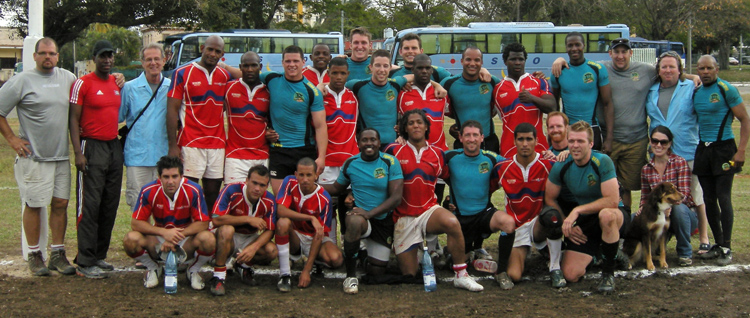
Cuban and American rugby sevens teams gather together after their
2/28/10 semifinal match.